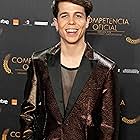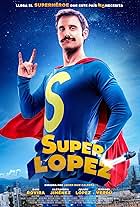Cuando entras a los 45 años, parece que ya has hecho todo en la vida: un marido, dos hijos, un perro y una casa con jardín. Pero, ¿eso es todo?Cuando entras a los 45 años, parece que ya has hecho todo en la vida: un marido, dos hijos, un perro y una casa con jardín. Pero, ¿eso es todo?Cuando entras a los 45 años, parece que ya has hecho todo en la vida: un marido, dos hijos, un perro y una casa con jardín. Pero, ¿eso es todo?
- Premios
- 2 nominaciones en total
Argumento
Reseña destacada
"The Double Plus Fifteen," directed by Mikel Rueda, stars Maribel Verdú, famously known for her role in "Y Tu Mamá También," as a middle-aged woman navigating a mid-life crisis. The film attempts to present a nuanced exploration of a woman's struggle with aging and identity, but its portrayal of her relationship with a fifteen-year-old boy is deeply problematic and unsettling.
Maribel Verdú plays a woman suggested to be around fifty, although the film never specifies her age. Her character, grappling with feelings of inadequacy and desperation, becomes entangled with a teenage boy facing his own set of challenges, primarily financial instability at home. The boy becomes a pivotal figure in her quest for validation.
The film employs an overuse of unfocused lenses, perhaps to illustrate the blurred lines of morality and perception within the story. However, this technique only serves to mask the inherent ethical issues in their relationship, rather than providing any meaningful commentary or depth. The visual ambiguity attempts to lend an artistic touch but ultimately fails to address the critical concerns head-on.
Verdú's character is portrayed as finding empowerment through her interactions with the boy, reclaiming a sense of youth and vitality. Yet, this framing is not only misleading but also deeply troubling. The significant age difference and the boy's vulnerability due to his difficult home life underscore a clear power imbalance. The film's romanticization of this dynamic dangerously skirts the line of normalizing predatory behavior.
The boy's home situation, marked by financial strain, is crucial to understanding his vulnerability. His involvement with Verdú's character is portrayed as a mutual, consensual exploration, but this narrative is problematic. The film glosses over the exploitative nature of their relationship, presenting it instead as a form of mutual solace. This portrayal minimizes the impact of such an imbalance and the potential harm to the boy.
Verdú's performance, while compelling, cannot overshadow the film's ethical missteps. Her character's journey of self-discovery is depicted at the expense of the boy's agency and well-being. The focus remains largely on her emotional revival, neglecting the boy's perspective and the exploitation he faces. This one-sided narrative risks perpetuating harmful stereotypes and justifying inappropriate relationships.
The movie's aesthetic choices, particularly the persistent use of unfocused lenses, attempt to create a dreamlike, almost surreal atmosphere. However, this stylistic decision detracts from the story's clarity and purpose, resulting in a disjointed viewing experience. The visual ambiguity reflects the film's broader reluctance to confront the moral and ethical implications of its central relationship.
"The Double Plus Fifteen" purports to explore themes of middle-aged crises and the search for personal validation through unconventional relationships. However, it does so in a manner that is both troubling and irresponsible. The film's portrayal of Verdú's character's actions as empowering is misleading and normalizes a predatory dynamic.
Maribel Verdú plays a woman suggested to be around fifty, although the film never specifies her age. Her character, grappling with feelings of inadequacy and desperation, becomes entangled with a teenage boy facing his own set of challenges, primarily financial instability at home. The boy becomes a pivotal figure in her quest for validation.
The film employs an overuse of unfocused lenses, perhaps to illustrate the blurred lines of morality and perception within the story. However, this technique only serves to mask the inherent ethical issues in their relationship, rather than providing any meaningful commentary or depth. The visual ambiguity attempts to lend an artistic touch but ultimately fails to address the critical concerns head-on.
Verdú's character is portrayed as finding empowerment through her interactions with the boy, reclaiming a sense of youth and vitality. Yet, this framing is not only misleading but also deeply troubling. The significant age difference and the boy's vulnerability due to his difficult home life underscore a clear power imbalance. The film's romanticization of this dynamic dangerously skirts the line of normalizing predatory behavior.
The boy's home situation, marked by financial strain, is crucial to understanding his vulnerability. His involvement with Verdú's character is portrayed as a mutual, consensual exploration, but this narrative is problematic. The film glosses over the exploitative nature of their relationship, presenting it instead as a form of mutual solace. This portrayal minimizes the impact of such an imbalance and the potential harm to the boy.
Verdú's performance, while compelling, cannot overshadow the film's ethical missteps. Her character's journey of self-discovery is depicted at the expense of the boy's agency and well-being. The focus remains largely on her emotional revival, neglecting the boy's perspective and the exploitation he faces. This one-sided narrative risks perpetuating harmful stereotypes and justifying inappropriate relationships.
The movie's aesthetic choices, particularly the persistent use of unfocused lenses, attempt to create a dreamlike, almost surreal atmosphere. However, this stylistic decision detracts from the story's clarity and purpose, resulting in a disjointed viewing experience. The visual ambiguity reflects the film's broader reluctance to confront the moral and ethical implications of its central relationship.
"The Double Plus Fifteen" purports to explore themes of middle-aged crises and the search for personal validation through unconventional relationships. However, it does so in a manner that is both troubling and irresponsible. The film's portrayal of Verdú's character's actions as empowering is misleading and normalizes a predatory dynamic.
Útil•10
- j_morales_pr
- 1 ago 2024
- Enlace permanente
Selecciones populares
Inicia sesión para calificar y añadir a tu lista para recibir recomendaciones personalizadas
- How long is The Double Plus Fifteen?Con tecnología de Alexa
Detalles
- Fecha de lanzamiento
- País de origen
- Sitio oficial
- Idioma
- Títulos en diferentes países
- The Double Plus Fifteen
- Localizaciones del rodaje
- Empresas productoras
- Ver más compañías en los créditos en IMDbPro
Taquilla
- Recaudación en todo el mundo
- 36.702 US$
- Duración1 hora 38 minutos
- Color
- Relación de aspecto
- 2.35 : 1
Contribuir a esta página
Sugerir un cambio o añadir el contenido que falta

Principal laguna de datos
By what name was El doble más quince (2019) officially released in Canada in English?
Responde
![Ver Tráiler [OV]](https://m.media-amazon.com/images/M/MV5BNzk0ZGMyYzMtNmVhNi00ZTdmLTg2MTAtYzY1OTdmY2IyZWFkXkEyXkFqcGdeQXRyYW5zY29kZS13b3JrZmxvdw@@._V1_QL75_UX500_CR0,0,500,281_.jpg)
























